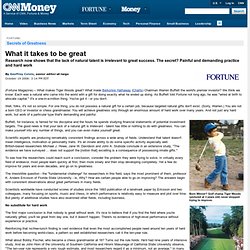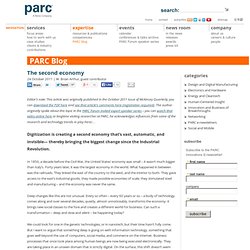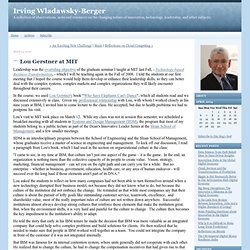

Secrets of greatness: Practice and hard work bring success - October 30, 2006. Research now shows that the lack of natural talent is irrelevant to great success.

The secret? Painful and demanding practice and hard work (Fortune Magazine) -- What makes Tiger Woods great? What made Berkshire Hathaway (Charts) Chairman Warren Buffett the world's premier investor? We think we know: Each was a natural who came into the world with a gift for doing exactly what he ended up doing. Well, folks, it's not so simple. Buffett, for instance, is famed for his discipline and the hours he spends studying financial statements of potential investment targets. Scientific experts are producing remarkably consistent findings across a wide array of fields. To see how the researchers could reach such a conclusion, consider the problem they were trying to solve.
The irresistible question - the "fundamental challenge" for researchers in this field, says the most prominent of them, professor K. No substitute for hard work The first major conclusion is that nobody is great without work. Why? The second economy. Editor’s note: This article was originally published in the October 2011 issue of McKinsey Quarterly; you can download the PDF here and see that article’s comments here (registration required).

The author originally spoke about this topic in the PARC Forum invited expert speaker series – you can watch that video online here (a longtime visiting researcher at PARC, he acknowledges influences from some of the research and technology trends in play here)… Digitization is creating a second economy that’s vast, automatic, and invisible— thereby bringing the biggest change since the Industrial Revolution. In 1850, a decade before the Civil War, the United States’ economy was small – it wasn’t much bigger than Italy’s.
Forty years later, it was the largest economy in the world. What happened in between was the railroads. Deep changes like this are not unusual. We could look for one in the genetic technologies, or in nanotech, but their time hasn’t fully come. Let me begin with two examples. Why Digital Talent Doesn’t Want To Work At Your Company. Fast Company wants you to have your best year yet in 2012; click for more advice and tips on how to work smarter, manage your career, and lead a more meaningful life.

Why doesn't digital talent want to work at your company? It’s not because you’re a consumer packaged goods company, rather than Google. It’s not because you’re in Ohio instead of Silicon Valley. It’s not because your salaries are too low, or because you don’t offer free food and laundry services. It’s because you’re not providing them the right opportunity. This, the opportunity to do great things, to make a real difference, is what drives most digital talent--whether they’re developers, designers, producers, marketers or business folks.
Most companies don’t offer this, so they skip your company and work somewhere that’s more innovative and exciting. But it takes more than lip service to make the sale. Digital talent won’t want to work at your company if: You need them more than they need you. Related articles: Lou Gerstner at MIT. Leadership was the overriding objective of the graduate seminar I taught at MIT last Fall, - Technology-based Business Transformation, - which I will be teaching again in the Fall of 2008.

I told the students at our first meeting that I hoped the course would help them develop or enhance their leadership skills, so they can better deal with the complex systems, complex markets and complex organizations they will likely encounter throughout their careers. In the course, we used Lou Gerstner's book "Who Says Elephants Can't Dance", which all students read and we discussed extensively in class. Given my professional relationship with Lou, with whom I worked closely in his nine years at IBM, I invited him to come lecture to the class. He accepted, but due to health problems we had to postpone his visit. Lou’s visit to MIT took place on March 12. "I came to see, in my time at IBM, that culture isn’t just one aspect of the game – it is the game. Lou focused most of his remarks on leadership.